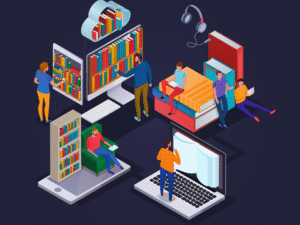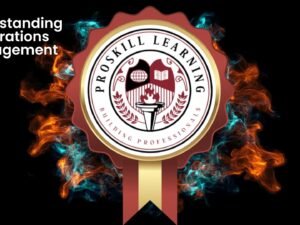Frontline Staff Empowerment
- Description
- Curriculum
- FAQ
- Reviews
Frontline staff are the face of every organization. The way they interact with customers, solve problems, and represent the brand has a direct impact on customer satisfaction, loyalty, and business growth. Frontline Staff Empowerment is a practical, scenario-based course designed to equip frontline employees with the skills, confidence, and mindset needed to deliver exceptional service in today’s competitive marketplace.
This course goes beyond basic customer service training by focusing on real-world empowerment—helping staff make better decisions, take ownership of outcomes, and balance flexibility with responsibility. Through engaging lessons, reflective exercises, and scenario-driven assessments, learners gain the tools to handle diverse customer situations with confidence and professionalism.
Key areas of learning include:
-
Developing a service-first mindset.
-
Building confidence and morale in daily interactions.
-
Applying problem-solving techniques and taking initiative.
-
Demonstrating ownership and accountability in customer service.
-
Understanding empowerment boundaries and managing risk effectively.
-
Leveraging tools and technology to enhance service delivery.
-
Creating strong teamwork and recognition cultures that sustain morale.
Learning Outcomes
Upon completion, learners will:
- Feel confident to take initiative and solve problems.
- Communicate effectively in diverse situations.
- Make informed decisions and manage risk.
- Use technology tools efficiently.
- Take ownership of customer experiences.
-
1Frontline Staff Empowerment - PreviewPreview 1 Min
Get a glimpse into the course.
-
21. Understanding the Frontline RoleText lesson
Module Structure
-
Module: 1
-
Duration: 5 Minutes
- Content Type: Text and Video
Description:
This module explores the critical impact frontline staff have on shaping customer experiences and brand perception. Learners will examine the difference between routine, transactional service and empowered, solution-oriented interactions. Through real-life scenarios, interactive exercises, and personal reflection, participants will gain a deeper appreciation of their role as the face of the organization — and how their actions influence loyalty, satisfaction, and service success.
Lesson Objectives:
By the end of this module, learners will be able to:
-
Recognize the importance and value of frontline staff in shaping customer perception and brand loyalty.
-
Differentiate between transactional service (routine, policy-driven) and empowered service (responsive, human-centered, and solution-focused).
-
-
3Understanding the Frontline Role - Quiz5 questions
-
42. Decision-Making at the FrontlineText lesson
Module Structure
-
Module: 2
-
Duration: 5 Minutes
- Content Type: Text and Video
Description:
This module focuses on building the confidence and clarity frontline staff need to make effective service decisions. Learners will explore a practical decision-making framework (the DECIDE model), evaluate real-life customer scenarios, and learn how to recognize when to take independent action or escalate an issue. This module ensures frontline staff can make timely, confident decisions while protecting both the customer experience and the business.
Lesson Objectives
By the end of this module, learners will be able to:
-
Apply a structured decision-making framework to customer-facing situations.
-
Identify clear boundaries for when to act independently and when to escalate an issue.
-
Balance customer satisfaction with company policy in real time.
-
-
5Decision-Making at the Frontline - Quiz5 questions
-
63. Communication Skills for EmpowermentText lesson
Module Structure
-
Module: 3
-
Duration: 5 Minutes
- Content Type: Text
Description:
Effective communication is the backbone of empowered frontline service. When you can actively listen, communicate assertively, and remain composed during difficult interactions, you not only solve problems, you build lasting trust with customers. This module equips you with practical tools and techniques to strengthen your communication skills so you can deliver exceptional service, even under pressure.
Lesson Objectives:
By the end of this module, learners will be able to:
-
Demonstrate active listening techniques to understand customer needs fully.
-
Use assertive communication to express themselves clearly and respectfully.
-
Apply empathy in conversations to create positive customer experiences.
-
Handle challenging customer interactions with professionalism.
-
-
7Communication Skills for Empowerment - Quiz5 questions
-
84. Problem Solving and InitiativeText lesson
Module Structure
-
Module: 4
-
Duration: 5 Minutes
- Content Type: Text and Video
Description:
This module equips frontline staff with the skills to think critically, act proactively, and deliver effective solutions in real-world customer situations. Learners will explore creative problem-solving techniques, such as the 5 Whys, to identify root causes and prevent recurring issues. They will also learn how to anticipate customer needs and take initiative to create positive experiences — turning potential challenges into opportunities for customer satisfaction and loyalty.
Lesson Objectives
By the end of this module, you will be able to:
-
Use creative problem-solving strategies to address challenges effectively.
-
Anticipate and respond proactively to customer needs before issues escalate.
-
-
9Problem Solving and Initiative - Quiz5 questions
-
105. Ownership and AccountabilityText lesson
Module Structure
-
Module: 5
-
Duration: 5 Minutes
- Content Type: Text and Video
Description:
This module empowers frontline customer service professionals to take personal responsibility for every customer interaction. Learners will understand the importance of owning tasks from start to finish, following through on commitments, and proactively resolving issues instead of passing them on. By practising accountability, they’ll build trust, strengthen customer relationships, and contribute to service excellence.Lesson Objectives
By the end of this module, learners will be able to:
-
Embrace personal responsibility in customer service — understand that your actions directly impact customer experience and the company’s reputation.
-
Follow through on commitments — ensure that every promise made to a customer is delivered accurately and on time.
-
Recognise that accountability is proactive — not just about fixing mistakes but preventing them.
-
-
11Ownership and Accountability - Quiz5 questionsScenario-Based Assessment
-
126. Empowerment Boundaries and Risk AwarenessText lesson
Module Structure
-
Module: 6
-
Duration: 5 Minutes
- Content Type: Text and Video
Description:
This module helps frontline staff understand the balance between taking initiative and protecting the business. Learners will explore the limits of their decision-making authority, recognize common risks in customer interactions, and practice knowing when to act independently and when to escalate. The module emphasizes using sound judgment to deliver excellent service while safeguarding financial, legal, and reputational interests.Lesson Objectives
By the end of this module, learners will be able to:
-
Define empowerment boundaries and why they are important in frontline roles.
-
Recognize common risks in customer interactions.
-
Apply practical judgment to decide when flexibility is appropriate and when escalation is required.
-
-
13Empowerment Boundaries and Risk Awareness - Quiz5 questions
-
147. Confidence and Morale BuildingText lesson
Module Structure
-
Module: 7
-
Duration: 15 Minutes
- Content Type: Text
Description:
This module focuses on the importance of self-confidence and morale in delivering excellent customer service. Learners will explore how recognition, self-awareness, and positive reinforcement enhance individual performance and team cohesion. Through practical tools and activities, participants will learn how to build confidence, maintain motivation, and contribute to a supportive and high-performing service culture.
Lesson Objectives
By the end of this module, learners will be able to:
-
Build confidence through recognition and self-awareness.
-
Foster positive team dynamics that uplift morale and performance.
-
-
15Confidence and Morale Building - Quiz5 questionsThis assessment is designed to test your understanding of how confidence and morale influence frontline performance. You will apply the concepts learned in this module—such as building self-awareness, recognizing strengths, and fostering positive team dynamics—to real workplace scenarios. The questions will help you reflect on practical ways to maintain confidence and boost morale for yourself and your team.
-
168. Tools and Technology for Empowered ServiceText lesson
Module Structure
-
Module: 8
-
Duration: 10 Minutes
- Content Type: Text and Video
Description:
In today’s fast-paced service environment, frontline staff rely heavily on the right tools and technology to deliver efficient, accurate, and personalized customer experiences. From Point-of-Sale (POS) systems in retail, to Customer Relationship Management (CRM) tools in banking and hospitality, to chat tools and feedback systems in delivery services, technology acts as the backbone of empowered service. This module highlights how using these tools correctly enhances productivity, builds trust with customers, and prevents costly errors. Learners will also understand the risks of not adopting or properly using technology and how it directly affects customer satisfaction and loyalty.
Lesson Objectives:
By the end of this module, learners will be able to:
-
Identify essential tools and technologies that support frontline service delivery.
-
Explain the role of technology in improving efficiency, accuracy, and personalization.
-
Understand the consequences of not having or misusing the right tools.
-
Leverage feedback and reporting systems for continuous improvement.
-
Apply technology effectively to strengthen customer trust, loyalty, and overall service experience.
-
-
17Tools and Technology for Empowered Service - AssignmentAssignment
-
18Tools and Technology for Empowered Service - Quiz5 questions
-
19Final Assessment - Frontline Staff Empowerment20 questionsThis final assessment brings together key lessons from all eight modules of the Frontline Staff Empowerment course. It uses scenario-based multiple-choice and multiple-answer questions to test learners on real-world application of skills such as problem-solving, ownership, accountability, confidence, teamwork, empowerment boundaries, and the use of tools and technology. The aim is to evaluate learners’ ability to apply knowledge in practical frontline situations, ensuring they are ready to deliver empowered, effective, and customer-focused service.

- Customer Service Representatives
- Retail Associates
- Hospitality Staff
- Call Center Agents
- Bank Tellers
- Front Desk Personnel
Secondary:
-
Supervisors and Team Leads (to support and reinforce empowerment principles).
-
HR and Training Professionals (for implementation and coaching support).
Archive
Working hours
| Monday | 8:00 am - 6.00 pm |
| Tuesday | 8:00 am - 6.00 pm |
| Wednesday | 8:00 am - 6.00 pm |
| Thursday | 8:00 am - 6.00 pm |
| Friday | 8:00 am - 6.00 pm |
| Saturday | 8:00 am - 6.00 pm |
| Sunday | Closed |









